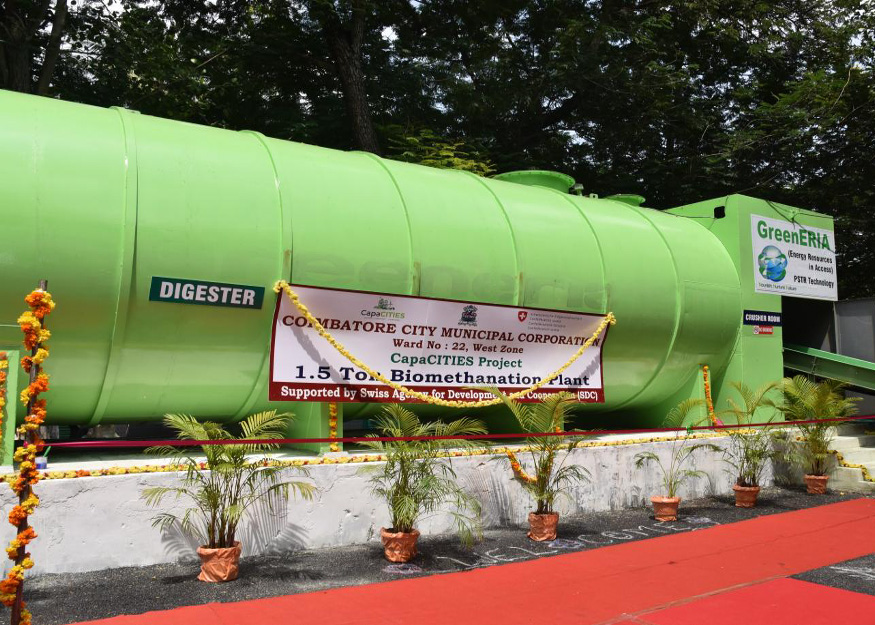

Project Overview
This project aims to build a waste management facility to process organic waste in the city of Coimbatore. Coimbatore is Tamil Nadu’s third-largest city with a population of 1.6 million (est. 2011) produces 400-600 grams/person/day (gpcd) and 1000 tonnes of waste per day (TPD), 50% of which is organic. Only 50% of the city’s organic waste is processed and the remaining percentage ends up in landfills. This results in a large amount of GHG emissions on account of methane, it is estimated that the sector is responsible for 500,000 tCO2e of the city’s GHG emission i.e., 17% of the total emissions in 2022.
The project is aligned to Coimbatore city’s Master Plan as well as Coimbatore Climate Action Plan. The project will result in significant reduction in Solid Waste Management expenditure of the city and would have wider climate and ecosystem benefits. It would reduce the Greenhouse emissions (GHG) which includes methane which is one of the most hazardous and powerful greenhouse gas contributing to the ozone layer depletion. In addition, the project would significantly reduce waste management costs for the city. Under the project aa greenfield facility for waste to BioCNG plant would be designed, build, financed and operated by the private investor on the land and basic infrastructure services provided by the city.
Sectors
- Energy
- Others (Low carbon-waste management, Climate & Environment)
US$30,900,000
Funding Goal
India
Country
Asia and the Pacific
Region
Objectives
- Development of a waste management facility to process ~200 TPD of organic waste which at present remains unprocessed and dumped in mixed landfill due to capacity and resource constraints.
- Optimization of the cost of organic waste management, the project would significantly reduce the cost per ton of organic waste processing for the city.
- Reducing greenhouse gas emissions from solid waste management and providing a key contribution to Sustainable Development Goals (SDGs) by improvement of ecosystem services for the city
- Provide a commercially viable model for delivering organic waste management plants in urban India.
Progress Tracker
Phases
-
Phase 1
Phase 1 of the project includes the development of 100 TPD waste to a bio CNG plant with a segregation capacity of 150 TPD. The project feasibility report, detailed project report and procurement documents have been completed. The project is expected to be tendered for public procurement by April 2023 and set to initiate operation by February 2024.
-
Phase 2
Phase 2 of the project includes expanding the facility to process 200 TPD organic waste to a bio CNG plant. The second phase of the project is expected to be initiated in March 2024.
Current Stage
Feasibility
Timeline
2 years
Project Milestones
N/A
ESG Impact
- Upstream GHG emissions from methane avoidance: From the proposed 100 TPD facility in Coimbatore, waste-to-bio-CNG would reduce emissions by 25,183 tCO2e per year over 15 years.
- Downstream GHG emission on account of displacement of conventional fuel by Bio CNG
Beneficiaries
- Direct Beneficiaries: 25,000 citizens living in the area around landfill; 60 direct employments generated.
- Indirect Beneficiaries: 1.6 mil. Citizens of the city due to ecosystem benefits in terms of pollution reduction, low risk of water contamination, health benefits among others
SDG Goals
Rationale
SDG 7: Affordable and Clean Energy – The project will substantially increase the share of renewable energy in the global energy mix.
SDG 11: Sustainable Cities and Communities – The project would reduce the negative environmental effects of cities on a
per-capita basis, particularly focusing on the air quality, municipal and other waste management.
SDG 12: Responsible Consumption and Production – Through waste prevention, reduction, recycling, and reuse, the project would significantly reduce waste generation.
SDG 13: Climate Action – The project will incorporate climate change measures into national policies, strategies, and planning.
Tracks
Risks and Limitations
What are the key risks, constraints and dependencies related to the project?
Operational Risks:
Availability and quality of waste
Policy Risks:
Contract implementation and arbitration
Offtake economics of BioCNG
Commercial Risks:
Clubbing non-viable businesses
Risk mitigation and continuity
- The contractual liability of city to provide waste and optimum sizing
- Provision of a 3rd party independent engineer
- Provision of pre-arrangement with oil marketing companies (OMC).
Financing
Funding Goal
US$30,900,000
Type of Investment
Equity; Debt
Financing Structure
Public Private Partnership
Secured Investment
N/A
Committed Government Funding
$3.4 Million
National and Subnational Investors
N/A
Committed Private Funding
N/A
Support
Technical Support Required
A full feasibility study including market analysis and business plan that will guide the scope, composition, and stages of implementation
Environmental and social impact studies.
Negotiating legal agreements with other stakeholders
Stakeholders
Governmental Buy-in
This project has been approved and funded under Jawaharlal Nehru Urban Renewal Mission (JNNURM) scheme of the Govt of India.
Approval from the Coimbatore City Municipal Corporation
State-level approval from Tamil; Nadu Urban Infrastructure Services Limited in the process
Other Forms of Governmental Support
SATAT Initiative of the Government of India guarantees fixed-price municipal waste to BioCNG plant purchases.
Under Article 6.2 of the Paris Agreement, compressed biogas is eligible for finance through Internationally Traded Mitigation Outcome (ITMO).
National Ministries Involved
Ministry of Housing and Urban Affairs-nodal ministry for the sector
Ministry of Environmental and Climate Change-for Article 6 transactions
Ministry of New and Renewable Energy- for central financial assistance scheme
Ministry of Petroleum and Natural Gas- for purchase assurance agreement of CNG.
SubNational Ministries Involved
Municipal Administration and Water Change Department, Government of Tamil Nadu
Department of Environment, Forest and Climate Change, Government of Tamil Nadu
Department of Municipal Administration, Government of Tamil Nadu
Tamil Nadu Urban Infrastructure Financial Services Limited
Tamil Nadu Infrastructure Development Board
Other Entities Involved
N/A
Licenses and Permits
N/A
Updates
Supporting Documents
No supporting documents included.
